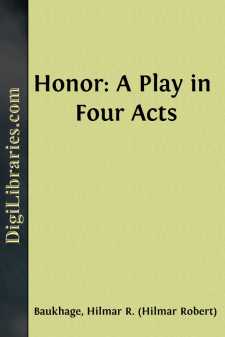Categories
- Antiques & Collectibles 13
- Architecture 36
- Art 48
- Bibles 22
- Biography & Autobiography 813
- Body, Mind & Spirit 142
- Business & Economics 28
- Children's Books 17
- Children's Fiction 14
- Computers 4
- Cooking 94
- Crafts & Hobbies 4
- Drama 346
- Education 46
- Family & Relationships 57
- Fiction 11829
- Games 19
- Gardening 17
- Health & Fitness 34
- History 1377
- House & Home 1
- Humor 147
- Juvenile Fiction 1873
- Juvenile Nonfiction 202
- Language Arts & Disciplines 88
- Law 16
- Literary Collections 686
- Literary Criticism 179
- Mathematics 13
- Medical 41
- Music 40
- Nature 179
- Non-Classifiable 1768
- Performing Arts 7
- Periodicals 1453
- Philosophy 64
- Photography 2
- Poetry 896
- Political Science 203
- Psychology 42
- Reference 154
- Religion 513
- Science 126
- Self-Help 84
- Social Science 81
- Sports & Recreation 34
- Study Aids 3
- Technology & Engineering 59
- Transportation 23
- Travel 463
- True Crime 29
Honor: A Play in Four Acts
Description:
Excerpt
HONOR
The French expression, a "man of the theater," is best exemplified in the person of the German dramatist Hermann Sudermann. The term is intended to convey the idea of a playwright who is interesting and effective, one who is, in short, master of his trade. The author of "Die Ehre," which is here presented for the first time to English readers, was for many years a man of the theater in the strictest acceptance of the term.
Hermann Sudermann was born at Matziken, Prussia, in 1857. After receiving his preliminary scholastic training in his native province, he attended the Universities of Konigsberg and Berlin and immediately after his graduation from the latter institution entered the field of journalism. His first works were short stories and novels, of which "Dame Care," "Regina," and "The Song of Songs" are the best known. German critics and the German reading public are inclined, of late years, in view of Sudermann's repeated failures in the field of drama, to place his fiction on a distinctly higher plane than his plays, and it is true that much of the finer intelligence of the man has gone to the making of his better novels. However, the earlier plays exerted an influence so widespread and are of such unquestioned intrinsic value, that there is some question as to the ultimate disposition of the laurels.
"Honor" was published in book form in 1888, the year before the founding of the famous "Freie Buhne," or "Free Theater," which was to usher in and nourish modern German Realism. It was first produced in 1890.
While Sudermann was not properly speaking a member of the new movement, his early works, "Honor" in particular, were shaped by and served partially to create the ideas which the founders of the "Freie Buhne," Arno Holz and Johannes Schlaf, had formulated. But a closer inspection of "Honor," of "The Destruction of Sodom," "Magda," and "The Joy of Living," leads us to the conclusion that Sudermann was playing with the Naturalistic formula, using it as a means rather than an end. One example will suffice: Arno Holz invented the phrase "Sequential Realism," by which he meant the chronological setting down of life in as minute and truthful a manner as possible. He aimed at the photographic reproduction of life; that process he called "art re-making nature." In his own plays, above all in "Die Familie Selicke," written in collaboration with Schlaf, his skill in noting details, his quest for truth at all costs, lent a decided air of actuality to the work, and the appearance was what Sudermann, who was more of an artist than the pair of young revolutionists, strove to imitate. After all, Sudermann is little more than a surface Realist, for he incorporated only what seemed to him valuable in the new formulas. Sudermann is the lineal descendant of Augier, Dumas fils and Sardou; he introduced into Germany a new manner of combining much that was good of the conventional and some that would prove beneficial of the Realistic ideas. The long speeches of Trast, the numerous asides, the more or less conventional exposition, the rather rhetorical style of the dialog, are reminiscent of the mid-century French dramatists, while the carefully observed types, the attention paid to detail, the occasionally realistic language, are indicative of the new spirit which was about to manifest itself in so concrete a form as the "Freie Buhne."
"Honor" is clearly a thesis play: it aims at the presentation and consideration of an idea, a problem, and the problem is that which arises when one's individual principles are at variance with those laid down in a conventional society....


